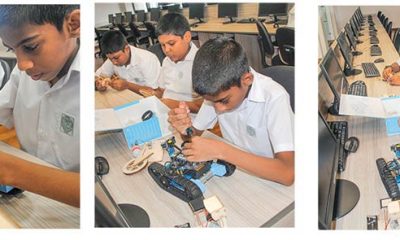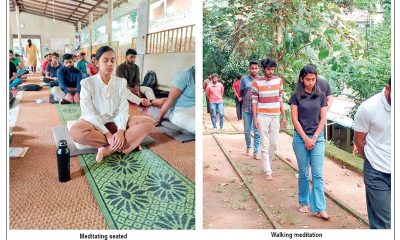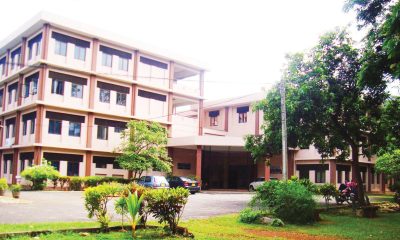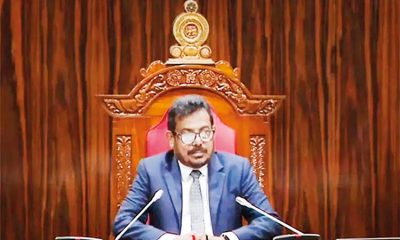Editorial
‘Maroon Wave’ and AKD Magic

Saturday 16th November, 2024
The JVP-led NPP has achieved the unthinkable. It made history when it swept Thursday’s general election and bagged all electoral districts except one. This is something unprecedented in this country. The NPP polled a staggering 6,863,186 votes (61.6%) and secured as many as 159 seats. ‘Even the ranks of Tuscany could scarce forbear to cheer’. Hardly anyone would have expected a political party to secure a two-thirds majority outright under the Proportional Representation (PR) system, but the NPP not only achieved that extremely rare feat but also delivered a kind of coup de grace to the Opposition, which will take a long time to recover. The UPFA and the SLPP mustered two-thirds majorities in Parliament, but they did so by engineering crossovers after obtaining 144 and 145 seats in the 2010 and 2020 general elections, respectively. The SJB came a poor second by obtaining 1,968,716 votes (17.7%) and 40 seats.
NPP leader Anura Kumara Dissanayake could not win the presidency outright in September; he received only 5,634,915 votes (42%) and therefore a preferential vote count had to be taken for him to be declared the winner, but he steered his party to a stunning victory two months later.
One may recall that the JVP achieved a similar feat in 2004 as a constituent of the SLFP-led UPFA coalition under President Chandrika Bandaranaike Kumaratunga; 41 of its 52 candidates who contested the 2004 general election on the UPFA ticket were returned, and it ‘donated’ two of its seats to the SLFP, which was troubled by an internal dispute over the National List slots. Anura Kumara Dissanayake, Wimal Weerawansa and Vijitha Herath topped the preferential vote lists in the Kurunegala, Colombo and Gampaha Districts, respectively, in that election.
Now, the road is clear for President Dissanayake and the NPP, and they will have to deliver what they promised the people, who have long wish lists. They will have to get cracking because 2025 will be an election year; the clock is ticking. They will have to straighten up the economy, grant relief to the public, strengthen the rule of law, eliminate corruption and waste, recover the stolen public funds, solve the unsolved crimes and bring the perpetrators thereof to justice. This no doubt is a tall order, but they have to make good on their promises.
It behoves the winners of electoral contests to bear in mind that their victories do not last forever, and they run the risk of being voted out of office one day unless they live up to the people’s expectations. They should learn from the ouster of President Gotabaya Rajapaksa, who was instrumental in delivering a two-thirds parliamentary majority to the SLPP in 2020. Gotabaya and other SLPP leaders failed because they let power get the better of them and surrounded themselves with some self-proclaimed pundits including university dons. They did not learn from their humiliating electoral defeat in 2015. Their party, the SLPP, which initially had a two-thirds majority in the last Parliament, has been reduced to a mere three seats, as a result.
It may be recalled that following Gotabaya’s impressive win in the 2019 presidential race, thousands of youth embarked on a campaign to re-cultivate abandoned paddy fields and adorned wayside walls with beautiful murals, some of which are still visible. But that government failed to live up to the expectations of those youth, who eventually turned against it, asking Gotabaya and his kith and kin to go home, due to an unprecedented economic crisis. Many of them left the country and others took to the streets, calling for a ‘system change’.
President Dissanayake has said he will not turn back until the country attains its development goals. He has also undertaken to cleanse Parliament as a national priority; thankfully, the ‘Maroon Wave’, which barrelled across the country on Thursday, has already flushed out many political dregs who polluted the legislature for many years. It is hoped that he will succeed in achieving his goals.
Editorial
Credential inflation and semantic drift

Wednesday 18th December, 2024
A new Speaker was elected unopposed yesterday in Parliament. Dr. Jagath Wickramaratne has succeeded Speaker Asoka Ranwala, who had to resign last week due to his failure to prove his academic credentials. It is popularly said in this country that a person who has been beaten with a firebrand is scared of even fireflies. So, Prime Minister Dr. Harini Amarasuriya and Leader of the House Bimal Ratnayake carefully avoided referring to Wickramaratne as ‘Dr’ when they proposed his name and seconded it, respectively. They may have done so lest they should provoke heckles from the Opposition members, who are making the most of the doctorate scandal in a bid to recover lost ground.
In the run-up to last month’s general election, the JVP-led NPP paraded the doctorates of its candidates to make them out to be superior to their counterparts fielded by other political parties. Its propagandists extolled their academic and professional achievements to the point of queasiness. Today, the government is wary of calling even a qualified medical practitioner a doctor upon his elevation to the Speaker’s post! Such has been the political cost of credential inflation that some NPP MPs resorted to boost their images.
Sri Lankan politics has not only caused the deterioration of economic, political, social, cultural and legal institutions but also led to the devaluation of concepts, ideas, ideals, and titles. Languages evolve and words acquire new meanings mostly through repeated association, which can be contextual, metaphorical, political, social, cultural or otherwise. We saw how the adjective, ‘righteous’, underwent semantic bleaching and drift due to being subject to sloganeering under the J. R. Jayewardene government, which promised to build a ‘righteous society’. ‘Righteous’ took on the exact opposite of its lexical definition and became synonymous with ‘unrighteous’, paradoxical as it may sound, in the political context in that socio-political milieu. The phrase, ‘righteous society’, evokes one’s dreadful memories of election malpractices, political violence, disproportionate counter terror, cronyism, corruption, etc., which the Jayewardene regime was notorious for. The Mahinda Rajapaksa government promised ‘a bright future’, which became a synonym for ‘pie in the sky’ to all intents and purposes. ‘Good governance’ or ‘yahapalanaya’, became devalued and took on a whole new meaning thanks to the UNP-led UNF, which misused it to dupe the public and capture power in 2015. ‘Prosperity and Splendour’, which the Gotabaya Rajapaksa government promised, eventually became coterminous with ‘bankruptcy and untold hardships’. The word, ‘renaissance’ is undergoing semantic bleaching under the incumbent NPP government as there has been no radical departure from the past either politically or economically, and what we are witnessing is stagnation.
The JVP-led NPP came to power by looking down upon almost everything previous governments had done since Independence. It called Sri Lanka’s post-Independence history a curse, and offered to put the country right and achieve progress. Its devaluation drive led to an unprecedented erosion of public trust in vital institutions, especially Parliament, which it vehemently condemned as a den of thieves. Some NPP MPs’ pretence to academic excellence has caused the public to treat academics and other professionals with suspicion and doubt their credentials. Worse, it is thought in some quarters that the courtesy title, Dr, can be as derogatory as ‘pickpocket’, etc., when used before the names of those who are neither doctorate holders nor medical practitioners! Hence, Justice Minister Harshana Nanayakkara’s complaint to the CID that there has been a sinister attempt to discredit him by placing the title, Dr, before his name on the parliamentary website.
The NPP sought a mandate to clean the Augean Stables by the Diyawanna lake and ensure that the national legislature would be full of educated, intelligent, patriotic men and women of integrity. It received an unprecedented mandate for that mission. But today it has had to put its own house in order by ridding itself of mountebanks who have been exposed for their fake academic credentials before it carries out its much-advertised clean-up campaign.
Editorial
A supreme irony

Tuesday 17th December, 2024
President Anura Kumara Dissanayake is scheduled to conclude a successful state visit to India, after having talks with Prime Minister Narendra Modi and other Indian dignitaries on an array of key issues. Some bilateral agreements are also reported to have been inked. Modi and Dissanayake have issued a joint statement. and the latter has invited the former to visit Sri Lanka.
President Dissanayake received a warm welcome from PM Modi and other Indian leaders in New Delhi. The guard of honour he was distinguished with at Rashtrapati Bhavan was of special interest. It is customary for any visiting head of state to be given such honour, but Tuesday’s guard of honour at Rashtrapati Bhavan was replete with historical significance and, above all, irony, which may not have been lost on keen political observers. What we beheld was proof of the resilience of democracy and Indo-Lanka relations.
President Dissanayake is the leader of the JVP, which unleashed mindless terror and plunged Sri Lanka into a protracted bloodbath purportedly to defeat, among other things, what it called Indian expansionism, which is the title of one of its five introductory lectures for new recruits. The JVP banned Indian goods and its death squads even killed traders who sold ‘Bombay onions’, which had to be renamed ‘Lanka big onions’ to save innocent lives. The JVP whipped up anti-Indian sentiments to such an extent that a Sri Lankan naval rating hit visiting Indian Prime Minister Rajiv Gandhi with the butt of his rifle during a guard of honour in 1987. It went all out to torpedo the Indo-Lanka Peace Accord, the 13th Amendment, which paved the way for devolution and the establishment of the Provincial Councils but did not succeed in its endeavour. However, its terror spree destroyed thousands of lives and state assets worth billions of rupees. It also did its darnedest to have the Indian Peace Keeping Force sent back, and scuttle elections.
Terrorism is no means to an end. It is the end and the means both. Rohana Wijeweera, who created the JVP terror in a bid to achieve his political goal, himself became a victim of counterterror, and Rajiv died at the hands of the very terrorists he saved from the Sri Lankan military and backed to the hilt. All those who opted for a Tiger ride for political expediency, suffered the same fate as the ‘Young Lady of Niger’. The tragic ends of President Ranasinghe Premadasa and countless Tamil politicians also serve as examples.
It was also a supreme irony that India, which the JVP once demonised, was the first country to invite JVP leader Dissanayake to a visit as a guest of the Modi government, while he was still in opposition, thereby giving him a much-needed diplomatic leg-up, wherefrom a great deal of legitimacy accrued to his presidential election campaign. Dissanayake himself has said so. Thus, India, which eventually let the LTTE stew in its own juice owing to the latter’s refusal to eschew violence, has arguably facilitated the JVP’s rise to power to a considerable extent.
What has become abundantly clear from the current JVP leader’s accession to the executive presidency, his desire to strengthen the Indo-Lanka ties and his state visit to India is the triumph of democracy over extremism. Democracy has also prevailed over LTTE terror, which destroyed thousands of lives and public assets worth billions of dollars, and the voice of the people in the North and the East is now heard. Today, thanks to the defeat of the LTTE on the military front, the civilians who were under its gun are free to exercise their democratic rights, especially franchise, and children can go to school without fear of being abducted on the way and turned into cannon fodder. There are some unsolved problems, but only a democratic approach will help find solutions thereto.
India is reported to have impressed on the Dissanayake government the need to conduct the Provincial Council polls expeditiously. The latter is sure to do so as soon as possible.
How would Wijeweera react if he knew of Dissanayake’s India visit and commitment to improving Indo-Lanka ties?
Editorial
‘Compass’ under the microscope

Monday 16th December, 2024
The JVP-led NPP, which embarked on a much-advertised, ambitious campaign to clean up Parliament by ‘filling it with honest, educated, intelligent members’, has had to cleanse itself. Speaker Asoka Ranwala had to resign on Friday, unable to prove his claim that he had a doctorate. The NPP leaders, who contested under the Compass symbol, and secured an unprecedented mandate to put the country right, were left with no alternative but to throw Ranwala to the wolves as they did not want the integrity of their moral compass questioned.
‘Doctorgate’, as it were, could not have come at a better time for the Opposition parties, which are still reeling from crushing electoral defeats and licking their wounds. It has provided them with a rallying point and an opportunity to divert public attention from their internal battles over National List appointments. Their leaders are now trying to make themselves out to be paragons of virtue!
Ranwala’s resignation has prompted some other NPP MPs, including ministers, to have the title of Dr. removed from their credentials. The government has been able to forestall the Opposition’s no-confidence motion against Ranwala as the Speaker. But the SJB says it will move a no-faith motion against Ranwala unless he resigns from Parliament on the grounds that he has deceived the voters in the Gampaha District, where he contested last month’s general election.
This, we believe, is a textbook example of twisting the knife. Opposition politicians are taking it a bit too far. Their argument that Ranwala entered Parliament by way of deception, has no leg to stand on. There is reason to believe that he would have been elected even if he had contested without flaunting the title, ‘Dr’, because he has been in the good books of the JVP/NPP leaders, who made it clear to the public that they wanted him elected.
Above all, the people of Gampaha have proved that they are not selective or choosy about the qualifications, educational or otherwise, of the candidates they vote for. In the 2010 general election, they elected a teledrama actress fielded by the UNP, giving her a staggering number of preferential votes simply because she had played the lead role in a subpar soap opera, which became popular. She admitted in a television interview that she knew nothing about Sri Lanka’s Constitution. Today, the UNP as well as its offshoot, the SJB, are out for Ranwala’s blood! Moreover, the people of Gampaha also elected the likes of Mervyn Silva and Prasanna Ranaweera, who boasts of having carried out a chilli powder attack on the UNP MPs in Parliament in 2018. Thankfully, they have not been able to re-enter Parliament.
It looks as if a branch of the Examination Department had to be set up in the parliamentary complex to check the educational qualifications of the MPs. Let the holier-than-thou Opposition politicians, who have taken the moral high ground, and undertaken the task of checking the authenticity of the academic credentials of the NPP politicians, be made to prove their own educational qualifications. We see among them a politician who was once accused of having sat a law examination in a separate room, and obtained external help to score very high marks.
This allegation, which went uninvestigated, should be probed. Better late than never. Some Opposition politicians who are parading their learning and questioning the academic qualifications of others have only aegrotats or unclassified degrees awarded by some foreign universities to candidates who cannot attend examinations due to illnesses.
Power blinds the wielders thereof to reality and fogs their thinking faculties, making it hard for them to act rationally. How the JVP/NPP politicians are behaving exemplifies a pithy local saying about the exclusivity of power and thinking capacity—‘bale thiyanakota mole ne, mole thiyanakota bale ne’ (‘when one has power, one has no brains and when one has brains, one has no power). They are doing exactly what they persistently condemned their predecessors for. A large number of videos highlighting their policy contradictions have gone viral in the digital space.
Worryingly, a bunch of tainted politicians who were beaten badly in last month’s parliamentary polls have been able to make use of the controversy surrounding MP Ranwala’s educational qualifications, to gain some political mileage. They have a remarkable ability to heal their wounds and regain their strength like ‘The Blob’, or ‘the many-headed slime’. The NPP seems to have underestimated their ability to do so. However, it will be a mistake for the Opposition parties to entertain the hope that they will be able to secure a bridgehead in the NPP-dominated national politics and launch a counterattack soon, without making a serious effort to regain public confidence by mending their ways.
-

 Opinion2 days ago
Opinion2 days agoDegree is not a title!
-

 Features5 days ago
Features5 days agoEmpowering the next generation: St. Benedict’s College brings STEM education to life
-

 Features3 days ago
Features3 days agoSpiritual Awakening of a Village
-

 News4 days ago
News4 days agoOver 300,000 Sri Lankans leave for overseas jobs this year
-

 Latest News4 days ago
Latest News4 days agoIndia’s Gukesh beats China’s Ding to become youngest chess world champion
-

 Features3 days ago
Features3 days agoRevisiting the role of education in shaping shared futures
-

 Editorial6 days ago
Editorial6 days agoAll hat and no cattle?
-

 Features3 days ago
Features3 days agoThe Silence of the Speaker and other matters











